
© The New Buckenham Society 2015 (rev 2023)
Can you identify people or dates, or add a photo?
or
Cookies are used to link to Google Analytics and Facebook but this site collects no personal information


Small building for plucking chickens
facing King Street
Barry Leggett lived in New Buckenham aged from 2-19
years old just after World War Two.
He writes:
I was born on the 26th January 1944 at Heath Road,
Banham, a small village south of Attleborough in
Norfolk. My father was Charles Francis Leggett (photo
on left) and my mother was Irene Constance née
Wharton. I had two older sisters Heather Jacolyn, born
1939, and Brenda Joyce, born 1941. My father was a farm
labourer and mother did various household work as a
home help, mostly for Norfolk County Council. I don’t
remember much about the house as we moved to New
Buckenham, two miles away when I was about two years
old.
The house in New Buckenham was an end of terrace cottage, now called Lawn Cottage, which was later to be
regarded as a very important historical house (see The Historic Buildings of New Buckenham, 2006, pub. Norfolk
Historic Buildings Group).
This was in Marsh Lane and stood back from the road opposite the old Village Hall which was a corrugated tin
building. The house we lived in turned out to be the servants’ quarters of what was a large house. We had a
kitchen range and inside copper boiler, which were in the lean-to part of the house.
The house was of clay lump and roughcast; it had two bedrooms with a landing, two rooms downstairs and a
large pantry. This pantry was big enough for a single bed which became my bedroom. The clay lump house was
continually damp. There was no running water, so water was collected in buckets from a tap at the other end of
the terrace next to a well which had been decommissioned. There was no modern oven just a very large cooking
range which we did not use as our cooking was done on a double paraffin stove. The brick built toilet was
about 20 yards away from the house. The other two next to it were for the other tenants in the terrace and were
constructed of corrugated tin. They had to walk past the front our house to go to the toilet. The toilets were
emptied every week by what was known as the night soil lorry. Some households had to bury the waste in their
garden. You didn’t take to long when you went to toilet the smell was awful. As there was no toilet paper
available, newspapers were cut up into squares and hung on a nail. There were no lights so after dark it was
candle or torch. Eventually toilet paper was available.
The house was heated by an open fire in the sitting room. Extra heat was provided by a paraffin heater which
caused a lot of condensation, this made the internal walls damp causing problems with the wallpaper. The
copper boiler in the kitchen was used for heating water for washing clothes and on bath night.
The washing was done by hand and most of the water was squeezed out by a mangle, that being a free-
standing device with two large wooden rollers turned by a handle. This was kept outside in a shed.
On bath night the fire was lit under the boiler. The galvanised bungalow bath (length 54 inches, width 20
inches, height 15 inches) was brought into the kitchen from the shed and everyone had a bath adding some
fresh water each time. Father got the short straw and went last. I don’t think the water was too dirty. In the
morning the water was used to water the vegetables. As there was no water on tap or flush toilets there were no
drains.
There was no heating in the bedrooms. On cold frosty nights it was nothing unusual to wake up with frost on
the inside of the windows. As there were only two bedrooms I shared the room with my parents whilst my
sisters had the landing. I eventually slept downstairs in the pantry on a sofa bed. It was only after my sisters left
home that I actually had a bedroom to myself. If you needed to go to the toilet during the night there was a
potty under the bed or a pail you could use. How basic could you get?
There was no fridge. The milk was delivered by Mr. Frost from Plum Tree farm in Upgate Street, Carleton Rode.
He delivered the milk by pony and trap. He would dispense the milk from a churn into our own receptacle. It
eventually was delivered in bottles by other members of the Frost family, Mr and Mrs Arbon.
Newspapers were delivered by Mr and Mrs Ayton who came by pony and trap from Attleborough. They
seemed quite elderly when I was 10 years old. When they retired, their son took over delivering papers by a
trade bike and eventually by a van.
There was no gas. The only plugs were 13amp round pin sockets. However an electric cooker was bought when
I was about 12. The garden, in front of the house, where Dad grew vegetables was most important for our
meals. We reared chickens and ducks to eat. All rationing had ended when I was 10 years old.
There were very few cars about. Dr. Blair, Mr. Gemmell, Mr Tofts and D. Hamerton were, as I recollect, the only
owners of cars. Most people used public transport or had a bicycle. There was a regular service from the village
to Norwich by the Eastern Counties Omnibus Company. The nearest train station was at Attleborough. There
was three lots of drivers and conductors based in New Buckenham as the buses were garaged at Smiths.
I went to the local school when I was five years old. The Head was Mrs Honeywood who lived in East Harling.
She was not a very pleasant person. The other teachers were Mrs Feltham and Mr Cook, both lived in the
village. I had dark red hair, and it was Mr. Cook who called me Rusty and that nickname has stuck with me
ever since. Lots of people today know me as Rusty. The main classroom in the centre of the school was heated
during the winter by an open fire. Mrs Honeywood would stand in front of it and raise her skirt at the back
taking in the warmth. The other thing was the third of a pint of milk supplied by the government for each child,
Unfortunately she had the knack of warming it up. That wasn’t so good. We sometimes had the pleasure of
cakes passed over the wall from Kemp’s bakery being next to the school.
Attending school had its difficulties, some no doubt caused by me. At the age of nine I transferred to Old
Buckenham Area School which was at least two miles away. I would normally have gone there at 11 years of
age. There was no bus travel so you had to make your own way by walking as I did in very bad snow or by
bicycle. Regardless of the weather you had to go. Later the school actually loaned out cycles for those who did
not own one. The Headmaster was Mr. Dazeley.
My first teacher at Old Buckenham Area School was Mr. Atkinson who was very pleasant indeed. At 11 years
old I moved into the higher school and had various teachers for different subjects. Although I was reasonably
academic, I did enjoy P.E. as it was known, with football being my main interest. Getting to school by bike was
in the winter sometimes difficult as I would have to go via the Dambrig which flooded the whole road. Brave
hearts went for cycling through it, others took to the high bank. This flooding went on for some years.
I was about 14 when I played table tennis with Peter Mapes, Arthur ? (who was deaf and dumb) and Roger
Kerrison in charge. I also, with Peter Mapes, played darts for The Kings Head. I also played football for New
Buckenham on a pitch on the common, getting it ready with Clive Rush and the loan of his dad’s tractor
New Buckenham is quite famous for its grid street layout. As a young boy this was totally lost on me, all I knew
was that in the village there were:
Castle Hill
Mr Holl - Vet; Happy Tofts - Garage
Chapel Hill
Mr Saunders - Builder
Chapel Street
Mr Simmonds - Fishmonger; Mrs Robinson – Publican, The George;
Mr Davey – General Haberdashers; Aldridge Brothers – Builder;
Police House (PC Blakey then PC Mumford); Methodist Chapel
Church Street
St. Martins Church, C. of E.
King Street
Mr. Goffin - Fishmonger; Mrs Goulding - Baker; King Bros - General Grocers;
Mr Claxton – General Grocers; Mr Golding – Garage; Mr Aldous – Post Office;
Mr Robbins – Barbers/ Shoe repairer; Mr Sutton - Butcher; Mr Saunders - Builder
Queen Street
Mr. Peake - Jeweller/Clock repairer; Mr Fox – Hardware Store
Market Place
Mr Ratley – Publican, The Kings Head; Mr Kemp – Baker; Mr Tofts - General Grocer;
Mr Smith – Garage; Dr Hamerton & Dr Bruce – Doctors surgery;
Mr Reeve - Blacksmith
The Green (south side of Market Place)
Mr Gilbert – General Haberdashers;
Mr Clowes – The Wine Press; Mr Clowes – Solictors
Norwich Road
Mrs Howling – Ladies Hairdresser
Wednesday was half day closing in New Buckenham. The village has a Market Cross with a whipping post. It
also has a Norman castle keep hidden from general view by circular mound which itself is surrounded by a
moat.
From 1945 into the 1950s rationing was still in place following the war and so there were certain limits to what
you could purchase. Food and clothes etc. but there was nothing to leave the village for in relation to obtaining
food, clothing or entertainment.
There was no dentist so I actually went to East Harling in a pub room to have a tooth removed. A bit basic. We
did have a doctor’s surgery in a room to the left of what was Dr. Blair’s home. This was Dr. Hamerton who
became quite a friend of the family. I even baby sat his children.
I attended the Methodist Sunday school from about the age of 10. Whilst attending Sunday School there was
the annual anniversary. All the children would put on a concert and would sing and recite poetry. I did several
singing solo items and had a good voice. The reward was the annual trip to Great Yarmouth by coach. This was
a real treat and we, as a family, would spend time on the beach and then go to the Circus in the afternoon which
of course had animals in the show. This was the only outing we had to the seaside in the year.
The one thing that was possible, in those days, was for any child in the village to leave their house in the
morning and be out all day either on the common playing, or venturing across the various farmers’ fields of the
various farms without fear of retribution. A penknife and a catapult were handy. No one worried as you were
certain to turn up for your tea if not earlier. You could also walk through the village late at night (there were no
street lights) and not be in fear of anything.
The Market Place is opposite the school and once a year Gray’s fair would set up whilst we were at school. To a
small boy it was quite exciting watching it being built. The fair was a very social occasion for the village and the
surrounding community.
Nearly every Saturday evening Hall’s mobile fish and chip van (from Banham) would park on the Market Place.
My main friends in New Buckenham were Tony Cooper who lived next door but one. Chris Davey who lived
locally and Michael Robbins who, lived in Old Buckenham but stayed at his grandparents house in New
Buckenham. His grandfather was in fact Mr. Robbins the hairdresser /shoe repairer. Mr Robbins was always
willing to let us borrow the football and cricket gear. The one friend who spent most of his time in my company
and at my house was Peter Mapes affectionately called Bubbah.
With other lads from the village, I played cricket or football on the common which at times had cattle grazing,
so before you played you were wise to check where they had been. The village pump on the market was a
godsend after playing sport as you could get a very cold refreshing drink from it and douse yourself with the
cold water.
When not playing sport we would roam around the area, the open common or the nearby fields, doing what
boys did then with bits of wood and a penknife, or even a catapult. All part of growing up.
During my youth I did several jobs to earn some pocket money. I sold vegetables round the village for Mr.
Robbins. I weeded the Market Cross pebble stones. I ran errands after school for two families outside the
village. I worked on farms especially in the summertime with the harvest. Helping Dad with sugar beet hoeing
by hand in the scorching sun was a real chore. During the winter I helped my dad in the sugar beet field but
that was extremely cold and wet. All done by hand, no machinery. But the income into the family was low and
every bit helped.
As a family I would join my mother and both sisters in
blackberry picking at the top of the common. The fruit would
then be taken to Reggie Saunders whose wife was an agent for an
unknown company and we would be paid by the pound. A van
would then collect every so often. Another earner for the family.
I also worked for Charlie Woodrow. He had premises in King
Street, the White Horse pub and small holding, and I helped with
plucking chickens, all done by hand in the small building
illustrated. I would earn money by stumping the carcases. I
would be about 14 years old (1958). Also did general jobs for him
but no pay but a trip to Attleborough cinema now and again.
I remember helping Mr. Reeve in his forge with pumping the bellows
leaving him to look after his fire. I also helped when he was repairing a
cartwheel standing by with water to douse the hot metal rim. This was
outside the front of the forge. I did these odd jobs for something to do.
Dad got a job with the Frost family, in Carleton Rode the next village, I
went to help and worked there mostly during the harvest. At that time
they still had horses (Suffolk Punches) and I did everything there is in
farming. Leading the horse on the harvest field, pitching the sheaves,
collecting from the field and using an elevator at the stack, helping with
the thatching of the stack and being there when the thrashing machines
arrived. Muck carting was by way of horse and tumbler (a two wheeled
cart), all done by hand.
Barry outside his home, now Lawn
Cottage. mid 1950s
Eventually a combine harvester was bought which made work a little easier. It was a dirty job with the dust.
Corn was put in sacks and put in the barn.
When I was 14 I had a racing cycle and would ride for miles around the local villages for the sheer pleasure and
even as a family we would all have cycles and visit relations.
Televisions were not affordable but again to our rescue came Mr Robbins. Some boys would crowd into his
house to watch the cup final from Wembley. Eventually, my parent had a black and white TV with three
channels; this with cards or reading the newspaper and radio was the only source of entertainment. At the age
of seventeen I passed my driving test and had a grey van which I drove about when I could afford the petrol.
I lived with my parents until I was 19 and left New Buckenham to join the Norwich City Police. On my days off
I would often visit the Frosts’ farm and help with various chores. I did this for several years until the death of
Charlie Frost. Afterwards I occasionally helped Leslie or George Frost.
New Buckenham will always have a place in my heart I thoroughly enjoyed my youth in a lovely village.
July 2023
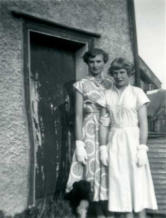

A post-war childhood in New Buckenham
Path in front of (now) Tanyard and Lawn Cottages. Mid to late 1940s
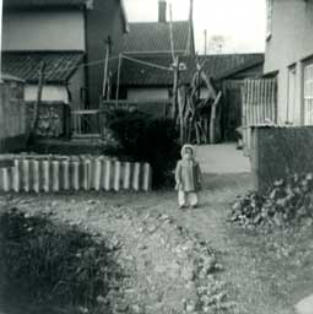
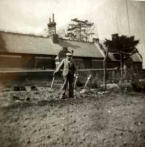
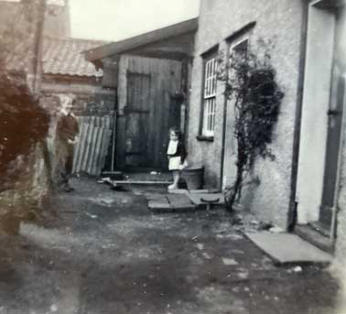
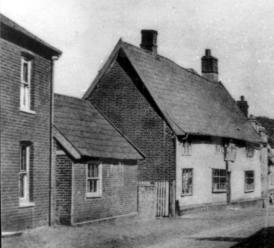
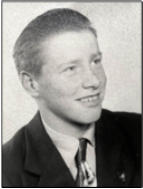
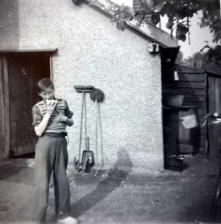




- Brief history of village
- A moated town
- William Barber's almshouses
- History of village school 1848-1912
- New Buckenham: the history of a market town
- Historic buildings research report (NHBG)
- History of individual properties
- Rogationtide in the 1590s
- Who was Boosey?
- New Buckenham in 1542
- Newspaper articles
- Prince Duleep Singh's photographs
- Vicarage







